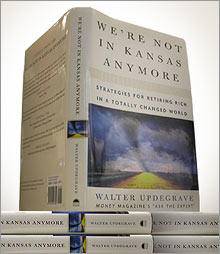|
Column Archive
Money Magazine Ask the Expert by Walter Updegrave
The term insurance no-brainer
Should I go with a cash-value policy, or get a term policy and put the money I save into an IRA?
NEW YORK (CNNMoney.com) - I just bought a home and I'm now looking for life insurance so my family can pay off the mortgage if I die prematurely. I can get a term policy for about $25 dollars a month or a permanent policy that also builds cash value for about $100 a month. Am I better off going with the cash-value policy, or should I go with the term policy and putting the money I save into an IRA? -- Ian, Bethlehem, Pennsylvania
There's an old New Yorker cartoon that shows a shipwreck survivor in ragged clothes, leaning back against a palm tree on a dot of land so tiny that the sea is lapping at his feet. The thought bubble coming out of his head says, "No man is an island, but I come pretty damn close." What's this got to do with your question? Well, true no-brainers are pretty rare in the personal-finance world. But if your question isn't one of them, it's pretty damn close. Before I tell you why, let me explain the difference between the two types of policies you're considering. A tale of two policy types
Term insurance provides bare-bones insurance coverage. As long as you pay the premium, the insurance company pays the face amount of the policy to your beneficiary if you die while the policy is in effect. Typically, term policies offer coverage for one, five, 10 or 20 years. You can renew the policy to extend your coverage, although term policies usually have an age limit, often 75 or so. The idea is that you're getting pure insurance protection for your money. With a cash-value policy, on the other hand, a portion of your premium buys insurance protection, but the rest goes into a savings or investment component. Depending on the type of cash-value policy you choose, your money could go into something akin to a savings account with interest paid by the insurer or it could go into investments much like mutual funds. Unlike term insurance, a cash-value policy covers you for your entire life, provided the premiums are paid. Because it must fund both insurance and investments, the premium in a cash-value policy is much higher than the premium for the same amount of insurance protection in a term policy. In your case, you must pay four times the premium of the term policy to get the equivalent amount of protection in the cash-value policy. Sometimes the difference is even larger. For that reason alone, I think term insurance is the better deal for most people. But there's another reason I'm not a big fan of investing through life insurance policies: The costs are usually much higher than in other investments, which cuts into your return. Insurance advocates will often point out that your returns aren't taxed while they're in the policy. But getting those returns out in a tax-efficient way can be complicated. I'm not saying that a cash-value policy can't work in some instances. If you really need the insurance to be there your entire life, it may be a good option. But those instances aren't very common, and when there are so many other investments with low costs that are also tax-efficient (I'm thinking index funds, ETFs, tax-managed funds), I see little need to complicate your life with life insurance investments. Here's what I suggest you do.
First, get a fix on how much life insurance you need. You can do that by going to a "needs analysis" calculator such as the one at the LIFE site. Next, check out sites such as IntelliQuote and Insure.com that give you premium quotes for policies from a variety of insurers. Annual renewable term is generally the cheapest option initially. The cost will rise every year as you age, however. So you may also want to consider "level premium" policies that allow you lock in the premium for anywhere from five to 20 years. Then start saving for retirement. Start with your 401(k) if you have one, then move on to IRAs and taxable accounts. One place to start is the MONEY 65, MONEY Magazine's elite roster of recommended funds. Many of the funds on this list are also highly tax-efficient, although that's less of a consideration for the money you're investing in 401(k)s and other accounts where earnings already grow without the drag of taxes. Follow this strategy and you'll have good shot at being able to live comfortably after you call it a career. And if, heaven forbid, you don't make it to retirement, well, then at least you can depart for the great beyond knowing you'll leave your family in decent financial shape. __________________ |
|


